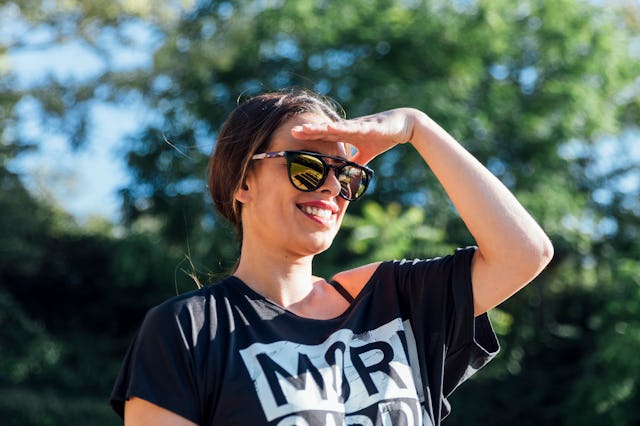Do Your Eyes Get More Light-Sensitive As You Age? Spoiler: It’s Not Your Imagination
We asked ophthalmologists for insight.

Do you find yourself reaching for your sunglasses — even on cloudy days — or squinting when you walk into a big box store because the overhead lighting is unbearably bright? In our 20s, we might have chalked that up to hangovers, but now it’s safe to say there’s something else at play. Hate to be the one to break it to you, but our eyes can, in fact, become more light-sensitive as we get older.
Scary Mommy spoke with three ophthalmologists who helped clear things up about this normal part of the aging process.
Why our eyes may become more light-sensitive as we age
As most of us experience in our 30s, our bodies aren't what they used to be. And along with creaky joints and gray hair, we may also start to notice changes in our vision. In addition to possibly needing glasses (or bifocals) for the first time, you may experience more light sensitivity than you did when you were younger. According to Michael Brusco, MD, an ophthalmologist, refractive surgeon and founder, and medical director of Brusco Vision, this is normal.
"General light sensitivity is affected broadly by how much pigment is within the iris — the colored part of the eye," he tells Scary Mommy. "A lot of pigment within the iris means there is more of a natural barrier to prevent excess light from reaching the back of the eye, or the retina." That means, on average, those with lighter-colored blue or green eyes tend to have more light sensitivity than those with darker-colored brown eyes because, "in effect, there's less of that pigment barrier to screen out excess light to the retina," Brusco explains.
Eye conditions like dry eye disease, cataracts, or inflammation inside the eye can also cause light sensitivity, says Sarah Sunshine, MD, an ophthalmologist and cornea specialist at the University of Maryland Medical Center and an assistant professor of ophthalmology and visual sciences at the University of Maryland School of Medicine.
"Cataracts happen when your natural lens gets cloudier, which is a normal process that happens with aging due to breakdown of the protein in the lens," she tells Scary Mommy. "This cloudiness can cause glare or halos around lights and difficulty seeing clearly — especially at night or while watching TV."
Sunshine explains that some people also develop dry eye or aqueous deficient dry eye as they age. This condition results from poor-quality tears on the surface of the eye and can be caused by changes in hormones or systemic diseases. Inflammation inside the eye, known as uveitis, can also cause light sensitivity as we age.
The good news is that these problems are treatable, she says, so you should discuss them with your eye care specialist.
While everyone's eye anatomy changes — developing smaller pupils and cataracts — they may affect every person differently, says Victoria Williams, DO, an oculoplastic surgeon, neuro-ophthalmologist, and owner of Williams Eye Specialty Clinic in Michigan.
How to protect your eyes
Whether you’re looking to prevent light sensitivity or you’re already dealing with it, here are a few ways to protect your eyes, according to the experts:
- Wear sunglasses: Make sure they offer adequate UV protection, Williams says. “Avoidance of excessive UV exposure when you're younger can also help because it will lead to less cumulative oxidative stress that affects the lens of the eye, leading to less light scatter and sensitivity,” Brusco advises.
- Wear a wide-brimmed hat: This can help limit the amount of sun exposure your eyes are getting, Williams says. Donning sunglasses and a hat “can help slow the process of cataract formation, which is a common cause of light sensitivity and glare with aging,” she explains.
- Keep your eyes lubricated: Sunshine recommends increased lubrication with preservative-free artificial tears, warm compresses, and eyelid scrubs if your eyes feel dry or scratchy.
- Optimize lighting in your environment: Use dimmer switches, decrease the brightness on your computer and phone screens or use screen filters, and take breaks from screen time, Williams advises.
- Eat healthily: “A good diet is beneficial for your eye health because it tends to reduce the inflammatory modulators that can cause problems to the tear film and the natural lens of the eye,” Brusco says.
- See a doctor: Sunshine recommends having a regular evaluation with your eye doctor to monitor for any problems and discuss any symptoms you may be having.
While we can’t stop the aging process, at least we can take steps to help protect our eyes and our health. “What would generally be good for your overall health is also good for your eye health,” Brusco says.